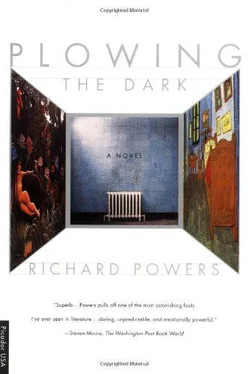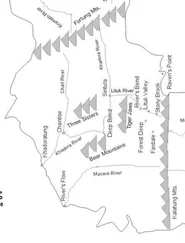He floundered for a while, working dopey editing jobs, hanging around City Lights, more or less making a stock commedia dell'arte figure of himself. After about a year of shiftlessness, he got a card from the two of them. They'd hooked back up and were living together. Life was long. Three weeks later, Spiegel landed a bank teller's job and settled
in for the duration.
From teller, he jumped to data processing, a vacancy in Operations that opened up after a junior operator went berserk and locked himself in the tape storage room with a bulk magnetic eraser gun. Fortunately the eraser, like the machines that had driven the operator to the breaking point, malfunctioned.
Spiegel discovered amazing digital aptitude. A surfeit of words and their ambiguity left him ready to love code's clean, definitive operands. Numbers were simple. They knew what they wanted. They rose and fell according to magnificent tabular design. The whir of the drive spindles, the chug of the card reader, the line printer's barrage all sounded a note of reason that, after the months of carping human clients — most of whom hadn't a clue what they wanted and conflated the Bay Savings Bank with their parents, tormentors, and lovers— struck Spiegel as heavenly.
A little judicious stretching of fact on his resume landed him a software job with a financial planning outfit up the Valley. He claimed he programmed, when, in fact, he thought COBOL was a minor goblin and couldn't have picked Ada from Pascal out of a police lineup. Then he promptly taught himself the basics in the first three weeks of the job. There the mystery opened to him, the secret brotherhood between fact and its description.
You have to imagine it, he tried to tell the woman who'd first set him upon the path of living algorithm. He laid it out for her over a digitally fabricated face towel, crumpled as if its owner had been taken unaware. My God! The Arabian Nights. The Arabian Nights. The full strangeness descended on him again, as it had in the year when he first looked on it. Wonder renewed itself in his replay, as the natural world renewed itself in imitating code.
Think of it: you just spell out a few descriptions. OK: a lot of descriptions. But stilly you type some words, the inner name of the thing. You describe how you want it. You build a topical outline of its behavior. Then you run the description, and there the idea is. Actual, working, in all its functional glory. Coming to life, on the terminal in front of you.
Adult Adie frowned at the thumbnail of the towel that they worked up on her screen.
No, Steve said. You can't possibly understand. There are too many layers now, between you and the artifact. Assemblers, compilers, interpreters, code generators, reusable libraries, visual programming tools. It wasn't always like this. You have to imagine looking at this towel, this beautiful, woven, cotton towel, falling in natural folds, as good as cloth. Have to imagine looking at it and seeing the realization of your own words, your own perfect, workable essay about the way that cloth looks and feels and falls.
Pygmalion?
He's in there somewhere. Orpheus might be closer. I'm telling you, writing my first subroutine was…like causing huge chunks of unravished bride to rise up, just by singing to her. A good, polished program was everything I thought poetry was supposed to be.
Stevie. You must have had a very peculiar idea of what poetry was supposed to be.
No different than any person who ever wrote it. I was going to get inside of reality and extract its essence, write down on paper the magic metrical words that, read aloud, would do their open sesame.
She looked at the screen, ready to deny everything. But she nodded. The vital formula. Sympathetic spells. Life's nail clippings. The impression of a body in bed.
He raced on, not hearing her. There was this kid poet, and he wrote and wrote. He rubbed the magic lamp until the poetic self-abuse police threatened to come impound him. And still nothing happened. The incantation seemed to be defective. Then they put the kid in front of this terminal and initiated him into the secret syntax. A few simple rules, combined in a few elegant ways, and blamm-o . The thing works. It runs. The world does move. The rules chum. The descriptions step their way through their own internal logic. The lines of code set more switches, change more states. Commands produce results.
The word made flesh.
Spiegel flinched. Don't mock me.
I'm not mocking.
Because that's exactly what it is. It doesn't matter if you're only talking about a formula for compound interest plugged into a general ledger
program. Change any variable and the executing universe alters. Move it to the left, increment it by a quarter percent, and the new result gets spit out whole. It gives one a tremendous feeling of—
Tower?
Perfectibility. Coding possessed a kind of reality check that sestinas never had. A program either worked or it didn't, and if it didn't work, it was wrong. Period. Something magnificent to that.
1 made a lot of wrong paintings in my life. Believe me. And I didn't need any machine to tell me they were wrong.
But you never knew, completely, when you made a right one.
Adie wrapped her self-indicting silence around her like a shawl.
It's…. funny, Spiegel went on. Art made all this happen, you know. The whole digital age. Music did it. Hollerith got his idea for the punched data card from the player piano. From the Jacquard tapestry loom.
Not guilty, Adie pled. I've got an airtight alibi.
That's what they all say. He nipped her chin between finger and thumb. You have to imagine. Programming blew my thinking loose. Absolutely liberating. It freed me up in a way I hadn't been sinc …
Since Yeats?
Since Yeats. The rules, the operators? They're completely open-ended. Extensible. Whatever you can imagine, they can build. Think of it: the universal behavior machine, able to build any gadget that crossed the human mind. Not a tool. The ultimate medium.
They dirtied the digital towel, enlarged it, opened it to the light, hung it back upon the sketched-in schematic of its hook, protruding from the left-hand wall.
You know, they say that a coder's whole concept of programming depends on his first language. Old FORTRAN dinosaurs are stuck in their own do-loops. COBOLers think the machine is only good for running accounts receivable. Kids raised on BASIC never break free of that GOTO. But you see, my first language…
Adie smiled, remembering, despite herself. Was another code all together. You're telling me that you were fated to wind up programming golden mechanical birds?
Well, we all end up working on whatever TeraSys lets us.
Jackdaw? Adie called to the one who was still a child. What was your first programming language?
The kid looked up from a screen filled with instructions. Somewhere in the sequenced lines, the tireless, interlinked description, a miraculous bedside drawer emerged, one that slid in and out of its wooden table. Wah? Eyebrows up, distracted. It took him a few processor cycles to parse the question. First language? Assembler.
But first languages never knew their last sentences. On that day when Spiegel left Bay Savings, he called his friends in New York to give them the change of address, never mind the fact that they'd never used the old one. Ted was out. Spiegel spoke with Adie, the same Adie who wouldn't remember the call when the time came to remember everything.
"He's starting to lose it," she reported. "Walking with a cane. He falls down a lot. Then he picks himself up as if nothing just happened."
Читать дальше












